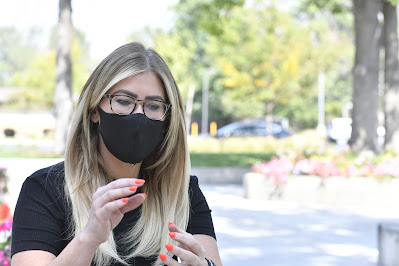Sarah Scott quit school in the eighth grade. A product of a “shaky family situation” with too much freedom for an already troubled kid, she started drinking at 13. She emancipated from her parents at 16.
Sarah, now 39, never could have imagined back then she would someday rely so much on the Disability Resource Center at Salt Lake Community College, which would become a kind of second family for a new chapter in her life.
A hard worker at heart, Sarah was a lower-level manager at two fast-food restaurants and living on her own at age 18. She moved from southern Utah back home to Los Angeles at 19 and began doing “big kid” drugs. Numbing the pain of unresolved childhood issues with alcohol and substances, she finally hit “rock bottom” by 23 and decided she needed to get sober.
Sarah began to get it right. She poured herself into jobs in the retail industry. She had some nice things and new friends through Alcoholics Anonymous. And then came a crushing blow in 2006 after temporarily losing sight in one eye twice, followed by a few brain scans – she was diagnosed with multiple sclerosis, just like what her dad had. She had watched her father deteriorate over the years – from walking, to using a cane, then a wheelchair as a quadriplegic. He lived for 47 years after his diagnosis before passing away this past February from complications of MS.
“That’s what MS looked like to me – I thought it was a death sentence,” Sarah says about her own diagnosis. Her ongoing symptoms include fatigue, problems with balance, generalized pain, muscle spasticity, slurred speech, difficulty with memory, or sometimes she can’t open her right hand. A myriad of maladies come and go at a moment’s notice.
Having MS made holding down a more physically demanding job – like being on her feet all day – much harder. After more than a decade in retail management in Los Angeles, she had to move on. By 2015, now back in Utah, the MS had really “kicked into gear,” as Sarah puts it. She took on work as an events planner and then, when the COVID-19 pandemic hit, she had been working for a music promoter, a job that vanished when concert venues went quiet. Lack of insurance. Financial insecurity. Her list of problems grew.
Sarah had already fought for and won disability benefits by 2018 – but they don’t pay all of the bills, she adds. With her MS getting worse, she needed a new plan. The Utah Department of Workforce Services helped her through its vocational rehabilitation services, which led her to Salt Lake Community College. Now late in her 30s, Sarah earned her GED in preparation for going to college. Scared, feeling like she wouldn’t fit in, not sure how to navigate the new world of higher education – let alone education at all, having not been to school since the eighth grade – Sarah was as uncertain as they come about getting started.
First, it was a person at an SLCC registration desk who helped Sarah with logistics. Then it was a college advisor who guided her academic path. But it would be the SLCC’s Disability Resource Center where she would meet more people, like Faye Edebiri, assistant director of the DRC. “Sarah has pushed through trying times to achieve her goals and to be a role model for other students with disabilities who may need some encouragement and motivation,” Faye says. “In her words, she said she wants to ‘help students through the difficult and scary process for those who don’t know about DRC resources or are intimidated, overwhelmed and don’t want to feel like a burden.’” With everything the DRC has done for Sarah, she is happy to return the favor. “They have all been so wonderful, compassionate and understanding,” she says about the DRC. “I was just riddled with anxiety.”
The DRC serves more than 1,900 students annually at SLCC with the top three disabling conditions including those with psychological/mental health conditions, learning disabilities, and ADHD. They helped Sarah by providing accommodations that ensure equal access and level the playing field in the classroom, conveying to instructors certain needs – like extra time or minimizing distractions for taking tests, help getting textbooks in audio format or help with assistive software for studying. The DRC has also helped others at the college understand Sarah’s disability, which isn’t readily obvious by looking at her because it’s an invisible disability, but every bit as challenging as a disability people can see with their own eyes. She says the DRC has helped her gain the confidence she needed to know she can succeed at college.
Sarah started at SLCC in spring, 2020 and hopes to transfer in a few years to a four-year school after earning an associate’s degree in psychology – her goal is a master’s degree and a career as a therapist. She wants to help people in the same spirit that she has been helped at SLCC. “You come here and you’re in an environment where people want to see you succeed,” she says about SLCC and the DRC. “People are genuinely happy for people who are kicking butt.”
SAVE THE DATE: The SLCC Disability Resource Center will once again hold activities during DiversAbility Awareness Week Jan. 25-29. Check back at the DRC’s online link for more details.




Comments
Post a Comment